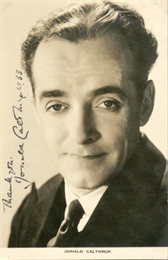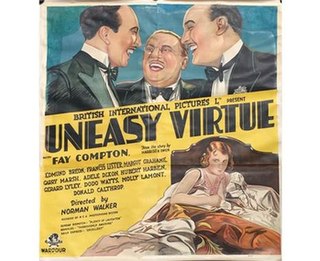Related Research Articles

A sound film is a motion picture with synchronized sound, or sound technologically coupled to image, as opposed to a silent film. The first known public exhibition of projected sound films took place in Paris in 1900, but decades passed before sound motion pictures became commercially practical. Reliable synchronization was difficult to achieve with the early sound-on-disc systems, and amplification and recording quality were also inadequate. Innovations in sound-on-film led to the first commercial screening of short motion pictures using the technology, which took place in 1923. Before sound-on-film technology became viable, soundtracks for films were commonly played live with organs or pianos.

Sound-on-disc is a class of sound film processes using a phonograph or other disc to record or play back sound in sync with a motion picture. Early sound-on-disc systems used a mechanical interlock with the movie projector, while more recent systems use timecodes.

Blackmail is a 1929 British crime thriller film directed by Alfred Hitchcock and starring Anny Ondra, John Longden, and Cyril Ritchard. Based on the 1928 play of the same name by Charles Bennett, the film is about a London woman who is blackmailed after killing a man who tries to rape her.
Phonofilm is an optical sound-on-film system developed by inventors Lee de Forest and Theodore Case in the early 1920s.

High Treason is a 1929 film based on a play by Noel Pemberton Billing. It was directed by Maurice Elvey, and stars James Carew, Humberstone Wright, Benita Hume, Henry Vibart, Hayford Hobbs, Irene Rooke, and Jameson Thomas. Raymond Massey makes his first screen appearance in a small role. The film was initially produced as a silent but mid-way during production, Elvey was pushed by the studio to add sound to the film in order to cash in on the talkies. Although a third of the film was filmed in sound, Elvey maintained much of the silent footage and dubbed over the dialogue for shots that were originally silent, with Elvey himself voicing some of the minor characters, which he admitted when interviewed by the Manitoba Free Press shortly after the film was released in the US. Likewise, BIP's Blackmail, directed by Alfred Hitchcock, was also turned into a sound picture mid-way during production and many of the silent scenes used dubbed dialogue and sound effects in a similar fashion to High Treason.

Benita Hume was an English theatre and film actress. She appeared in more than 40 films from 1925 to 1955.

Donald Esme Clayton Calthrop was an English stage and film actor.

Balaclava is a 1928 British silent and sound war film directed by Maurice Elvey and Milton Rosmer and starring Cyril McLaglen, Benita Hume, Alf Goddard, Harold Huth, and Wally Patch. It was made by Gainsborough Pictures with David Lean working as a production assistant. The charge sequences were filmed on the Long Valley in Aldershot in Hampshire. Although the sound version had no audible dialogue, it featured a synchronized musical score with sound effects. The sound version was released in the United States under the title Jaws Of Hell.

The Divine Spark is a 1935 British musical film directed by Carmine Gallone and starring Marta Eggerth, Phillips Holmes, Benita Hume and Donald Calthrop. An Italian-language version Casta Diva was shot simultaneously. Both films were made at the Tirrenia Studios in Italy.

Uneasy Virtue is a 1931 British comedy film directed by Norman Walker and starring Fay Compton, Edmund Breon, Francis Lister, Donald Calthrop, and Garry Marsh. It was produced by British International Pictures and shot at the company's Elstree Studios. The film was based on the 1927 West End play The Happy Husband by Harrison Owen.
The Crooked Billet is a 1929 British sound part-talkie drama film directed by Adrian Brunel and starring Madeleine Carroll, Carlyle Blackwell and Miles Mander. It was released in both silent and sound versions, as its production came as the industry was shifting over. It was made by Gainsborough Pictures at their Islington Studios. The sound version features some sequences with audible dialogue. The rest of the film featured English intertitles with a synchronized musical score and sound effects.
Men of Steel is a 1932 British drama film directed by George King and starring John Stuart, Benita Hume and Heather Angel. The screenplay was adapted by Edward Knoblock and Billie Bristow from a novel by Douglas Newton. It was shot at Walton Studios as a quota quickie for distribution by United Artists.

Kim Peacock (1901–1966) was born on 24 March 1901 in Watford, Hertfordshire, England. He was an actor and writer, known for Midnight at the Wax Museum (1936), BBC Sunday-Night Theatre (1950) and Hit Parade (1952). He died on 26 December 1966 in Emsworth, Hampshire. He played the title character in the BBC Radio serial Paul Temple between 1946 and 1953.

The Wrecker is a 1929 British-German sound crime film directed by Géza von Bolváry and starring Carlyle Blackwell, Joseph Striker, and Benita Hume. While the film has no audible dialog, it was released with a synchronized musical score with sound effects. The film was based on the play of the same title by Arnold Ridley. It was produced by Michael Balcon for Gainsborough Pictures in a co-production with the German firm Felsom Film.

A Honeymoon Adventure is a 1931 British thriller film directed by Maurice Elvey and starring Benita Hume, Peter Hannen and Harold Huth. Written in collaboration by Rupert Downing and Basil Dean, it The film was shot at Beaconsfield Studios. Location shooting, including the railway scenes took place in Scotland.

The Clue of the New Pin is a 1961 British second feature ('B') crime film directed by Allan Davis and starring Paul Daneman, Bernard Archard and James Villiers. The screenplay was by Philip Mackie, based on the 1923 Edgar Wallace novel of the same title which was previously filmed in 1929. It is part of the series of Edgar Wallace Mysteries films made at Merton Park Studios from 1960 to 1965.

The Clue of the New Pin is a 1923 crime novel by the British writer Edgar Wallace. it was first published by Hodder & Stoughton in London, 1923.
A Light Woman is a 1928 British silent romance film directed by Adrian Brunel and starring Benita Hume, C. M. Hallard and Gerald Ames. It is also known by the alternative title Dolores. The screenplay concerns a flighty young woman who learns the error of her ways through a series of love affairs.

The Crimson Circle is a 1929 British-German sound part-talkie crime film directed by Frederic Zelnik and starring Lya Mara, Fred Louis Lerch, and Stewart Rome. In addition to sequences with audible dialogue or talking sequences, the film features a synchronized musical score and sound effects along with English intertitles. The sound was recorded via the De Forest Phonofilm sound-on-film process. The film is an adaptation of the 1922 Edgar Wallace novel The Crimson Circle in which Scotland Yard detectives battle a gang of blackmailers. A previous UK version was filmed in 1922.
The Happy Ending is a 1925 British silent drama film directed by George A. Cooper and starring Fay Compton, Jack Buchanan and Joan Barry. It was based on a play by Ian Hay. Its plot concerns a father who deserted his family some years before returning home only to find his wife has told his children and neighbours that he died as a hero when he abandoned them. A sound film of the same play The Happy Ending was made in 1931.
References
- ↑ Low p.349
- ↑ BFI Database entry
- ↑ BFI Database entry